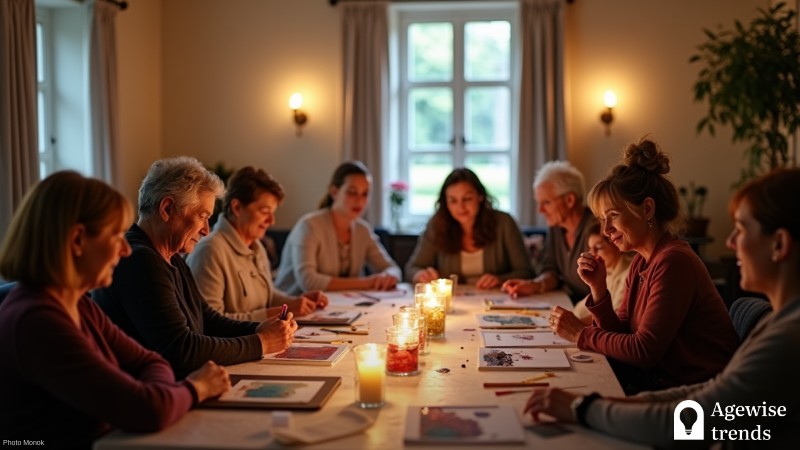Navigating the intense emotions and psychological shifts that come with loss can be daunting. Research highlights the benefits of group support for individuals struggling with grief. Bereavement groups provide essential emotional relief and social connections, helping the grieving process feel less isolating.
A 2020 review synthesizing over a dozen studies found that bereavement groups can lead to short-term improvements in grief and depression levels when compared to those without such interventions. While these immediate effects are promising, the long-term impact remains uncertain due to the lack of standardized grief support programs. Still, research shows that group interventions help participants feel better understood and offer much-needed emotional support.
Key Takeaways
Group support through bereavement programs helps ease grief and depression by offering emotional relief and social connections.
- Bereavement groups result in short-term improvements in grief and depression levels, though long-term effects remain uncertain due to a lack of standardized programs.
- Participants experience reduced emotional vulnerability and lower stress after attending regular support group meetings.
- Social connection is vital for healing; bereavement groups foster stronger emotional bonds through shared experiences.
Reducing vulnerability and stress during grief
One key benefit of bereavement groups is reducing emotional vulnerability during the grieving process. A study of 64 bereaved individuals found that those who participated in a six-week bereavement program experienced a significant decrease in their sensitivity to grief, indicating improved mental well-being.
Additionally, support groups help mitigate stress, a common challenge faced by the bereaved. Participants reported feeling less overwhelmed and noted lower stress levels after regularly attending support group meetings. This highlights the therapeutic value of consistent peer interaction during such difficult times.
Social connection as a cornerstone of healing
Social connection plays a crucial role in healing, as many grieving individuals find comfort in sharing their experiences within a supportive community.
Research shows that bereavement groups offer valuable emotional relief, especially in the early stages of grief. A study involving 46 participants found that attending group sessions helped foster stronger emotional connections through shared experiences.
However, the effectiveness of these groups may diminish over time as grief intensity subsides, emphasizing the importance of sustained support beyond the initial stages of loss.
The consequences of inadequate support
Without adequate support, grief can become overwhelming, leading to exacerbated depressive symptoms. Research shows that those who lost their spouse and lacked proper support reported feeling more isolated, sad, and at risk of depression.
Loneliness often acts as a trigger for negative emotions, further reinforcing the need for ongoing emotional connections during bereavement. Additionally, societal expectations that discourage emotional expression can contribute to higher levels of stress and depression among the grieving.
Expert guidance and coping strategies
While support groups are beneficial, professional counseling provides additional guidance for those struggling with overwhelming grief. Mental health professionals specializing in grief counseling offer customized strategies to help individuals navigate their emotions. These professionals help people process their grief in a structured way, ensuring they receive the necessary support to heal.
Some key coping strategies include allowing oneself to experience emotions rather than suppressing them, which promotes authentic healing. Acknowledging and expressing grief helps individuals come to terms with their loss rather than bottling up their feelings. Establishing a daily routine also creates stability amid emotional distress. Simple activities like having regular meals or engaging in hobbies provide a sense of normalcy, helping individuals stay grounded as they cope with grief.
Maintaining social connections through support groups or personal networks fosters emotional resilience. Surrounding oneself with understanding and supportive people can make the grieving process less isolating. Additionally, seeking professional counseling offers extra support in managing intense emotions effectively. Therapists provide personalized coping strategies and techniques, helping individuals find healthy ways to process their grief and move forward.
Grief is deeply personal, but structured support systems provide valuable tools for emotional processing. By integrating social connections, structured routines, and professional guidance, individuals can navigate their grief while honoring the memories of their loved ones. Support groups and mental health resources offer essential pathways to healing, helping the bereaved move forward with strength and resilience.















